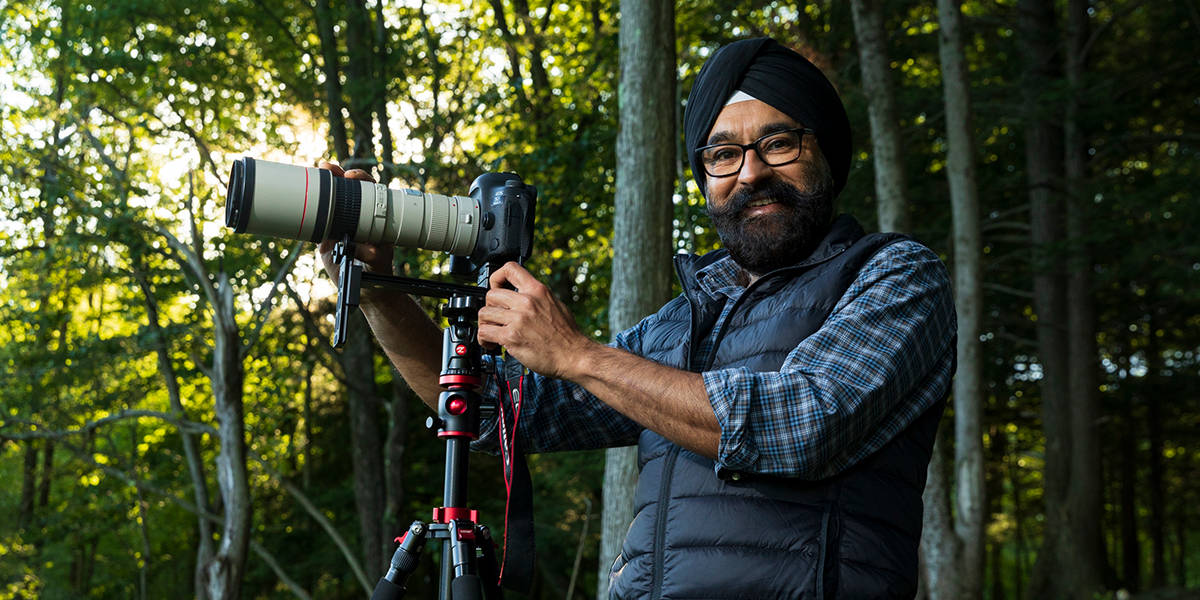School of Management’s Surinder Kahai shares passion for teaching, photography
Kahai recently named one of the 50 best undergraduate business professors in the nation

Associate Professor Surinder Kahai admits that he wasn’t always as close to his School of Management students as he is today.
But when he sent his daughter off to college, he hoped that the faculty there would care for her along her educational journey — and it led to self-reflection about his own teaching style.
“I said to myself: If I’m expecting that her professors are going to take care of her, it means that I’ve got to do the same with my students,” he says. “Otherwise, I wouldn’t have the moral authority to expect that for her. From that day on, things haven’t been the same.”
His current philosophy is to take the time to do things right, both in and out of the classroom as well as with his family and his photographic endeavors around the world.
Kahai’s attention to his students — who he considers “like my children” — is just one reason he was named one of the 50 best undergraduate business professors in the nation by Poets & Quants. Another is his prolific body of research, which includes more than 7,300 Google Scholar citations. He also was honored with the Chancellor’s Award for Excellence in Teaching in 2002-03.
Although he started his academic career in chemical engineering (earning his BTech at the Indian Institute of Technology and MS at Rutgers University), Kahai wanted to delve into something with a wider scope. He earned his PhD in business administration at the University of Michigan and joined the Binghamton University faculty in 1991.
Over his 30-year career at the School of Management, Kahai has analyzed the intersection of leadership and technology through the lens of management information systems (MIS).
Technology has evolved rapidly over that time. As a PhD student in the late 1980s, he says, “the first thing that MIS researchers studied was to explore how we could use local area networks [LANs] in one room to support group discussions. If you’re in a group and you have the leader leading the others via technology, how does that shape the interaction and how does that shape the outcomes?”
Later in the 1990s and early 2000s, as the internet became increasingly important in our daily lives, Kahai shifted his focus to companies’ use of teams that work remotely — a topic that resonates even more strongly in the era of the COVID-19 pandemic as more people have worked from home.
Today’s internet connections may be faster than ever, but Kahai believes that when managing remotely, nothing beats a good old-fashioned phone call. Supervisor and employee can discuss not only work-related tasks, but also catch up on their lives in general.
“Many bosses still believe that they can drive their workers to do more work,” he says. “All they believe we need are email and Zoom, and we are good to go. They still hold the team members responsible for work that may not be done as expected, without taking into account the challenges that they are facing at home with children or other aspects of their lives.”
As a professor, Kahai treats his students the same way. For instance, while teaching a fully remote class on blockchain in fall 2020, he hopped onto Zoom whenever anyone had questions, and he even tutored some who struggled so that they would better understand the course material.
Near the end of the semester, a few students stopped by his office — with proper COVID protocols, of course — to give him a framed illustration of a lonely boy gazing out from a distant asteroid with an inscription: “It doesn’t matter that you’re not here in person, as long as you are here in my heart.” The artwork now has a prized place on a shelf behind his desk.
“If you have done something from the genuineness of your heart, it’s not difficult for the other person to see,” he says, “even when you don’t meet with that person face to face.”
Kahai puts the same mix of patience, enthusiasm and love into his breathtaking photos, which reveal moments from time spent at national parks and beauty spots as well as at cityscapes and iconic buildings. He has an eye for “anything that I can make look beautiful,” but most often he turns his camera to landscapes and flowers.
Because he sometimes takes up to four hours to get the perfect shot, taking photos of humans can be tricky. “I can’t expect them to be as patient as a flower or landscape would be!” he says with a chuckle.
“I’m a totally different person when I’m taking pictures. For me, it’s an escape from anything else that is going on in my life. My family has a good time taking my picture in awkward positions. I don’t even realize what I’m doing — then they show those photos of me, and we have a good laugh!”
